“I had wanted to work up North for a very long time. At the beginning of my career, at the St-Vincent-de-Paul hospital in Sherbrooke, the assistant-head-nurse would do contracts in Fermont. At one point he said to me, “I could see you up North.” He left it at that but the idea never left me. One day, I felt the need for a change… They were looking for someone in Puvirnituq. They called me back two years after my interview. I went up to do my first stretch 6 years ago. Then I moved up North with my wife. During our two-year wait, the stars aligned. My wife was working in a pharmacy and now she is a beneficiary attendant. Our children had left the nest. We embarked on the journey without any expectations. We said to ourselves: “We’ll go and do our best. If one of us doesn’t feel right, we’ll come back south.”
I’m a team leader. I supervise over a dozen beneficiary attendants, almost all of whom are Inuit. For the Inuit, tomorrow is still far away. They really live in the present moment. Planning is a real challenge. It’s another way to frame certain priorities, both in a day’s work and in your personal life. We learn as much from them as they learn from us.”






